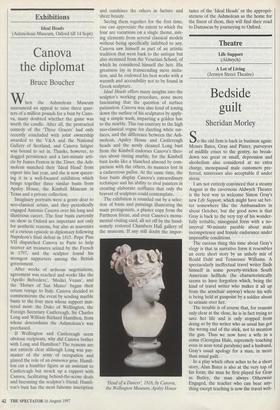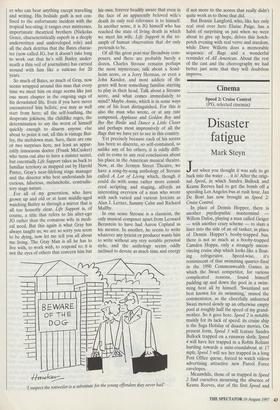Theatre
Life Support (Aldwych)
A Lot of Living (Jermyn Street Theatre)
Bedside guilt
Sheridan Morley
So the old firm is back in business again: Messrs Bates, Gray and Pinter, purveyors of midlife crises to the gentry, no break- down too great or small, depression and alcoholism also considered at no extra charge, menopausal male customers pre- ferred, mistresses also acceptable if under stress.
I am not entirely convinced that a steamy August in the cavernous Aldwych Theatre is the best way to welcome Simon Gray's new Life Support, which might have sat bet- ter somewhere like the Ambassadors in about October, but the good news is that Gray is back to the very top of his wonder- fully irritable, misogynist form with a no- interval 90-minute parable about male incompetence and female endurance under impossible conditions.
The curious thing this time about Gray's elegy is that in narrative form it resembles an eerie short story by an unholy mix of Roald Dahl and Tennessee Williams. A spectacularly ineffectual travel writer finds himself in some poverty-stricken South American hellhole (he characteristically seems to have forgotten which, being the kind of travel writer who makes it all up from the armchair anyway) where his wife is being held at gunpoint by a soldier about to urinate over her.
The trouble is of course that, for reasons only clear at the close, he is in fact trying to save her life and is only stopped from doing so by the writer who as usual has got the wrong end of the stick, not to mention the gun. Thus we now have a wife in a coma (Georgina Hale, supremely touching even in near-total paralysis) and a husband, Gray's usual apology for a man, in more than usual guilt.
In a play which often aches to be a short story, Alan Bates is also at the very top of his form; the man he first played for Gray as Butley, the man always Otherwise Engaged, the teacher who can bear any- thing except teaching is now the travel writ- er who can bear anything except travelling and writing. His bedside guilt is not con- fined to the unfortunate incident with the tropical bee-sting; it ranges over mistresses, importunate theatrical brothers (Nickolas Grace, characteristically superb in a deeply underwritten and undeveloped role) and all the dark detritus that the Bates charac- ter (now called JG, but it doesn't take long to work out that he's still Butley under- neath a thin veil of journalism) has carried around with him like a suitcase for 20 years.
So much of Bates, so much of Gray, now seems wrapped around this man that every time we meet him on stage seems like just one more chapter in the ongoing saga of his devastated life. Even if you have never encountered him before, you may as well start from here; all the self-loathing, the desperate joltiness, the childlike rages, the determination to say the worst of himself quickly enough to disarm anyone else about to point it out, all this is vintage But- ley, the meltdown man. Sure, there are one or two surprises here, not least an appar- ently innocuous doctor (Frank McCusker) who turns out also to have a sinister secret, but essentially Life Support takes us back to familiar territory as mapped out by Harold Pinter, Gray's near-lifelong stage manager and the director who best understands his curious, hilarious, melancholic, contradic- tory stage nature. For all of my generation, who have grown up and old or at least middle-aged watching Butley as through a mirror that is all too honestly clear, Life Support is, of course, a title that refers to his alter-ego JG rather than the comatose wife in medi- cal need. But this again is what Gray has always taught us; we are so sorry you seem to be dying, now let me tell you all about me living. The Gray Man is all he has to live with, to work with, to respond to; it is not the eyes of others that concern him but his own, forever beadily aware that even in the face of an apparently beloved wife's death its only real relevance is to himself. In another sense, it is JG himself who has reached the state of living death in which we meet his wife. Life Support is the tri- umph of human observation that Art only pretends to be.
Of all the great post-war Broadway com- posers, and there are probably barely a dozen, Charles Strouse remains perhaps the most mysterious; talk about a Sond- heim score, or a Jerry Herman, or even a John 'Candor, and most addicts of the genre will hear something familiar starting to play in their head. Talk about a Strouse score, and what comes immediately to mind? Maybe Annie, which is in some ways one of his least distinguished. For this is also the man who wrote, or at any rate composed, Applause and Golden Boy and Bye Bye Birdie and Dance a Little Closer and perhaps most impressively of all the Rags that we have yet to see in this country.
Yet precisely because each of his scores has been so discrete, so self-contained, so unlike any of his others, it is oddly diffi- cult to come to any real conclusions about his place in the American musical theatre. Now, at the Jermyn Street Theatre, we have a song-by-song anthology of Strouse called A Lot of Living which, though it could do with some rather more consid- ered scripting and staging, affords an interesting overview of a man who wrote with such varied and various lyricists as Alan J. Lerner, Sammy Cahn and Richard Mullby.
In one sense Strouse is a classicist, the only musical composer apart from Leonard Bernstein to have had Aaron Copland as his mentor. In another, he seems to write whatever any lyricist or producer wants him to write without any very notable personal style, and the anthology seems oddly inclined to devote as much time and energy 7 suspect the rottweiler is a substitute for the young offenders they never had' if not more to the scores that really didn't quite work as to those that did.
But Bonnie Langford, who, like her only real rival over here Elaine Paige, has a habit of surprising us just when we were about to give up hope, drives this hotch- potch evening with real verve and stardom, while Dave Willetts does a memorable sequence of Rags and a wonderful reminder of All American. About the rest of the cast and the choreography we had better just note that they will doubtless improve.



























































 Previous page
Previous page